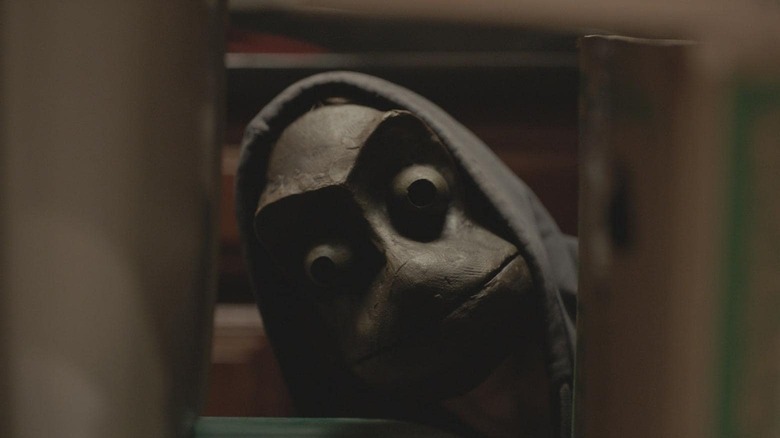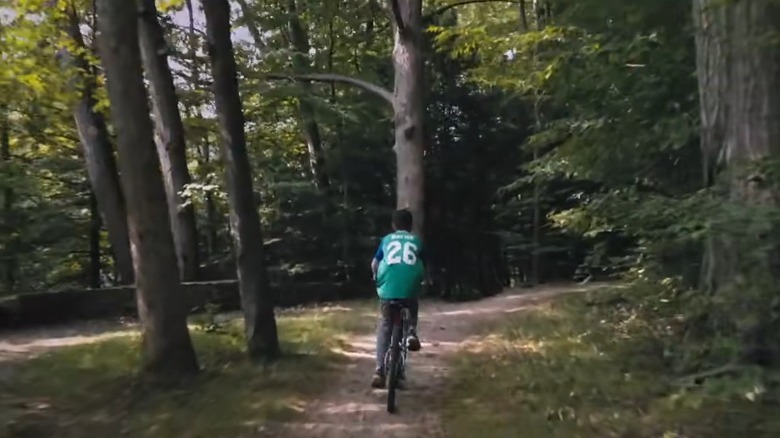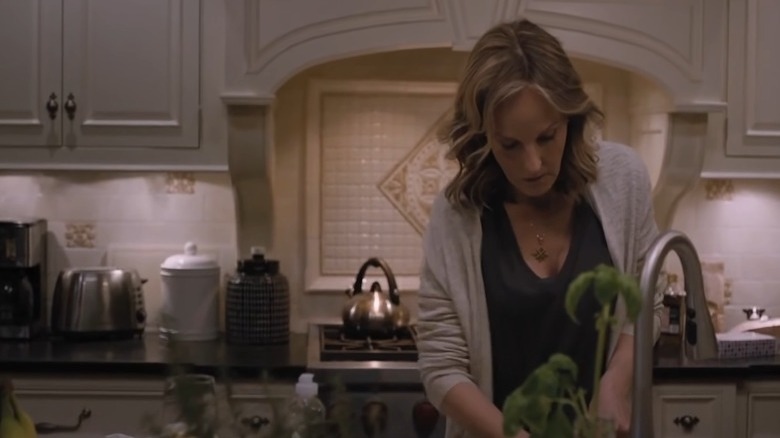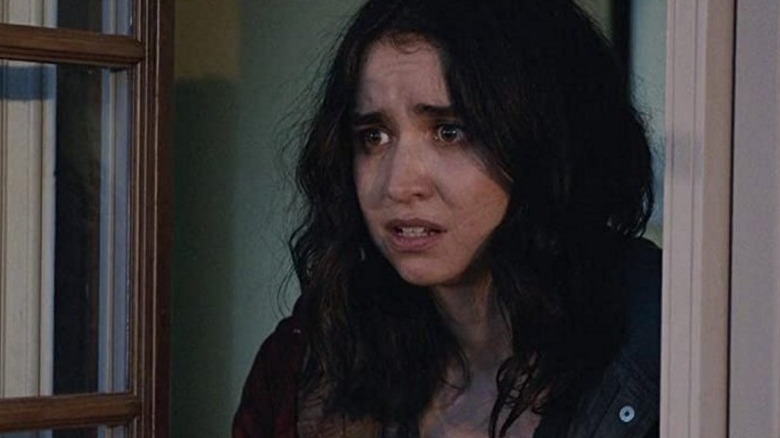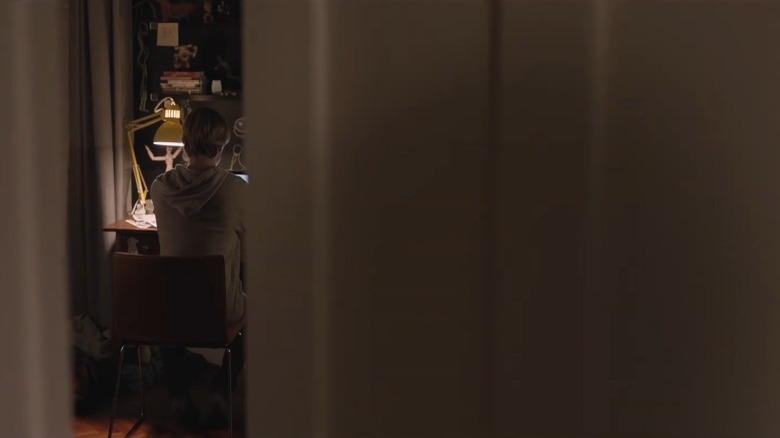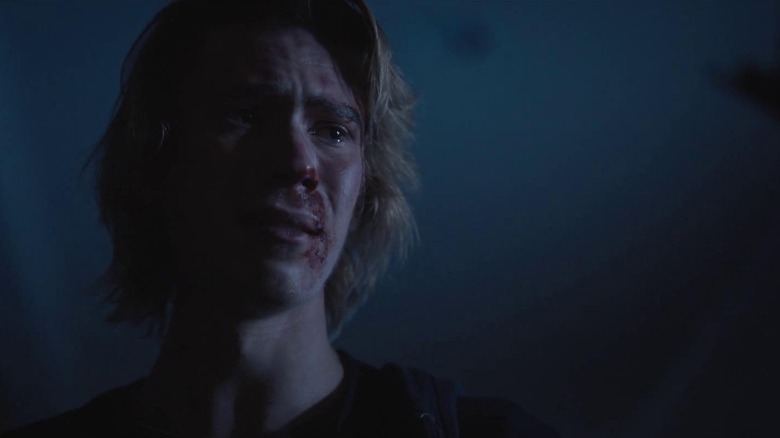I See You Ending Explained: Small Town Secrets
It's a story we see all the time. A quiet and quaint lakeside town. A family from that town maintaining appearances in public but breaking down in private. A series of vicious crimes that even the town's seasoned detectives have a hard time wrapping their heads around. Ultimately, a darkness emerges from the picture-perfect facade and swallows it whole.
So it goes in Adam Randall's 2019 film "I See You." It is something of a mystery movie, a thriller that draws anxiety and suspense from the question of what is lurking beneath the surface of what you're seeing. Even though the small town with hidden crimes setup is familiar, the story goes in wild directions that keep the viewer from ever feeling truly grounded.
What makes the movie different from that setup is the vast array of plot reversals; the way moments take on new meaning when viewed from a different perspective; the haunting cost of an individual's crimes. It may not be hitting the highs of the best unconventional small-town crime tale "Twin Peaks," but it marches to its own beat, handling moments of betrayal and violence with a detached, widescreen visual sensibility. And there are a lot of questions raised throughout.
The dizzying twists come into clarity in the final moments, but the movie takes many gambles getting there, including a meandering opening act and a major perspective shift about halfway through. Who is the "I" of the title? Who is the "you?" When a young boy (Riley Caya) is flung from his bike during a routine ride through the woods, the camera adopts an all-seeing, omniscient perspective, zooming into the boy's route from high above. He disappears.
Missing children
The big trick of the movie is that the boy's fate is not really the driving narrative engine of the movie. Even though Detectives Greg Harper (Jon Tenney) and Spitzky (Gregory Alan Williams) are on the case, the movie is just as concerned with what's going on in Harper's home. If "I See You" isn't one of the best detective movies, that's because its focus is just as much on familial strife than the case at hand. Director Adam Randall's misdirection here is potent.
Harper's family life has been complicated, possibly torn beyond repair from his wife Jackie (Helen Hunt) having had an affair. Now, Jackie suffers the insults of her teen son Connor (Judah Lewis) and Greg sleeps on the couch, returning to work every morning to solve the case of the kid's abduction, making progress when we do see him work. A green pocket knife found on the ground by the child's last location suggests an old case: a convicted pedophile and child abductor named Cole Gordon, locked up 15 years ago.
We're given just enough clues regarding the nature of the crime to stay curious and invested, but the movie stays around the Harper homestead, giving us extensive shots laying out the geography and the pristine interior design. If some of the repetitiveness around the house seems to drag on, it's necessary too. The undercurrent of the family being watched, emphasized by a long string of voyeuristic wide shots that slowly zoom in, doesn't seem to be developed. At one point, Greg steps out on the roof to see what looks like his son's joints in a mug. The slowly creeping shots suggest that he's about to get thrown off and the threat in the house feels supernatural.
Perfect, All-American family
Like a lot of movies dealing with the horrors underneath the polite veneer of small-town life, "I See You" uses the dissolution of the family unit at the movie's center as a mirror. The threat inside the house wouldn't be as effective if the family hadn't already destroyed themselves, but there they are, in a beautiful home, totally unwilling to trust each other or even communicate beyond the surface level.
Greg gets locked in a closet mysteriously. When a repairman tells Jackie her "daughter" let him in, she doesn't even question it. Bringing it up with Connor just starts another fight about her affair.
Her lover Todd (Sam Trammell) returns to the house too. One of director Adam Randall's great plays here is refusing to underline the nature of Todd and Jackie's relationship, or making explicit what she saw in him or what led to the distance between her and Greg. In giving the viewer just a brief glimpse of Todd — the polar opposite of Jackie's moody, obsessive husband — we know enough. As the two talk outside, Todd gets hit by the same mug Greg spotted on the roof earlier, meaning it was probably Connor's doing. She leaves Todd in the basement to drop Connor off at school.
By the time she's able to check back in on Todd in the evening, he's been killed and she assumes it was Connor's doing. Together, she and Greg discard the body with the ease of any of the great criminal cinematic couples. And Connor, still oblivious, is on his computer, reeling when he gets a message: "Do you know what phrogging is?" Behind him, a masked figure approaches.
His parents return from their body-burying to find him tied up in the bathtub, with a green pocket knife.
Phroggers
"Phrogging," as the movie helpfully explains, refers to the act of secretly living in a house, without the residents' being aware. It's a bit like squatting, but with an actual presumed victim — the people in the house.
Rather than the supernatural threat teased throughout the movie's first half, we learn that the people responsible for the home invasion are a man and a woman maybe a few years older than Connor. Their names are Mindy and Alec (Libe Barer and Owen Teague), as they explain to the camera via their video diary. For them it's like tourism, a chance to vicariously experience the lives of these people. And in the case of the Harper household, they've been given especially chaotic lives to observe, and to destroy. Mindy notes that Alec picked this house out and it's his first time phrogging. They're both anxious, but excited, setting up shop in the family's attic.
It's a big twist, one worthy of Rian Johnson's "Glass Onion." Effectively, it puts the unsettling and meandering quality of the movie's first half through a new perspective, as everything falls into place. We relive the first half of the movie with these new characters, and see how every creepy bit of psychological pain unleashed on the family has come from them. The "daughter" the repairman saw? Mindy. The joints in the rooftop mug? Alec's. Greg mysteriously getting locked in a closet? Also Alec.
As time goes on, their actions become darker. Alec becomes drawn to a different aspect of the crime — the ability to "mess with" people — and his psychopathic designs quickly overtake the initial experiment.
Who killed Jackie's lover?
Because of all this, any perceptive audience member begins to suspect Mindy and Alec were responsible for Todd's death. The thrill of the phrogging has given way to both of them being paranoid and nervous, knowing they can't get away with it much longer. But Alec hangs on, as if he's on a mission to ruin these peoples' lives.
In fact, the two have nothing to do with Todd's death. Mindy ends up seeing the man in the family's basement. She then sees Greg violently kill him before planning with Jackie to dispose of the body, in one of the most disturbing moments of the movie. When she goes upstairs to warn Alec, we realize he was the man in the mask, now tying up Connor in the bathtub and a few moments away from shoving Mindy down the stairs. He puts her unconscious body in Greg's car and plots his next move. When Jackie finds her son tied up, she takes him to the hospital, and Greg drives off to parts unknown.
In Greg's car, Mindy wakes up to discover many green pocket knives, realizing she's in the car of the child abductor, who we now realize is Greg. The movie has made a point of setting up clues as to Greg's secret identity: the troubled marriage, the late nights, the sleeping on the couch, and more explicitly the killing of Todd. He brings Mindy back to the house to kill her after she stumbles on the hidden location of the missing boys. She's already called the cops, but we know Greg is capable of handling a body.
After killing her, he is attacked by Alec and knocks him out.
Alec's revenge
While many of the movie's questions are resolved by the time you get to the climax, one major mystery remains. Why was Alec so focused on ruining this particular family? Many houses could have been picked by the phroggers, so what led to them picking this one? Again, the movie's hidden the explanation in plain sight, making it so obvious it doesn't register until you get to the final moments. So many twists have been deployed at that point that the clearest answer is foggy.
The last time the town saw child abductions with the green pocket knives was some 15 years ago. Spitzky, Greg's partner, has always taken credit for putting away Cole Gordon, the man presumed responsible. Naturally, the case's resurgence led to the cops looking into the victims, and where they are now. One is clearly mentally unwell, hardly able to communicate with the police. The other is a mystery.
At his home, Greg is eventually shot by Alec in the garage, just before the arrival of the police. Spitzky emerges from his vehicle to shoot Alec in the shoulder and then he takes another look, clearly recognizing the young man. It's been 15 years since they've seen each other.
As the movie edges into its haunting conclusion, flashbacks show Alec as a boy, crosscut with his being wheeled into an ambulance truck as an adult. We realize we're seeing the abduction and the perpetrator is not Cole Gordon but someone we recognize — Greg. The twists throughout the movie shift our perspective and understanding of the characters. At first, Alec and Mindy's phrogging turns them into villains destroying a family's life. But in the movie's final moments, it becomes clear that for Alec it was an act worthy of the best revenge movies.
